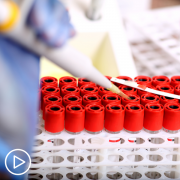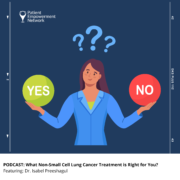An Expert’s Hopeful Outlook on Myeloma Research and Treatment
An Expert’s Hopeful Outlook on Myeloma Research and Treatment from Patient Empowerment Network on Vimeo.
Myeloma expert Dr. Nina Shah shares why she’s hopeful about research and treatment, including immunotherapy and CAR T-cell therapy.
Dr. Nina Shah is Associate Professor of Medicine in the Department of Medicine at the University of California San Francisco (UCSF) and treats patients at the Hematology and Blood and Marrow Transplant Clinic at UCSF Helen Diller Family Comprehensive Cancer Center. Learn more about Dr. Shah, here.
Related Programs:

|

|

|
Transcript:
Katherine Banwell:
Is there emerging myeloma research that you feel patients should know about? And what are you excited about?
Dr. Shah:
There are so many aspects of myeloma treatment and the patient’s journey that we have been looking at. One of the things that I’m most excited about and I do a lot of research in is immunotherapy, which includes both CAR T-cell therapy as well as natural killer cell therapy and bispecific T-cell engager and other novel immunotherapies.
And I think these are interesting, because they allow for the patient’s own immune system sometimes to be used to kill the myeloma. And that’s something that is spring-boarding the way we treat myeloma to give patients better outcomes with less toxicity, if you can believe that. So, we’re really excited about that.
The other thing I’m really excited about is patient experience research that we’re doing. We now know that multiple myeloma patients live for maybe over a decade, and those patients are on a marathon of treatment; and how that treatment is a part of their life is very important in their experience as a patient. So, we’re trying to make that easier for patients as they go through, for example, transplants or maybe immunotherapy to give them more information, more control and more ability to talk about their symptoms with their provider and their care team.










